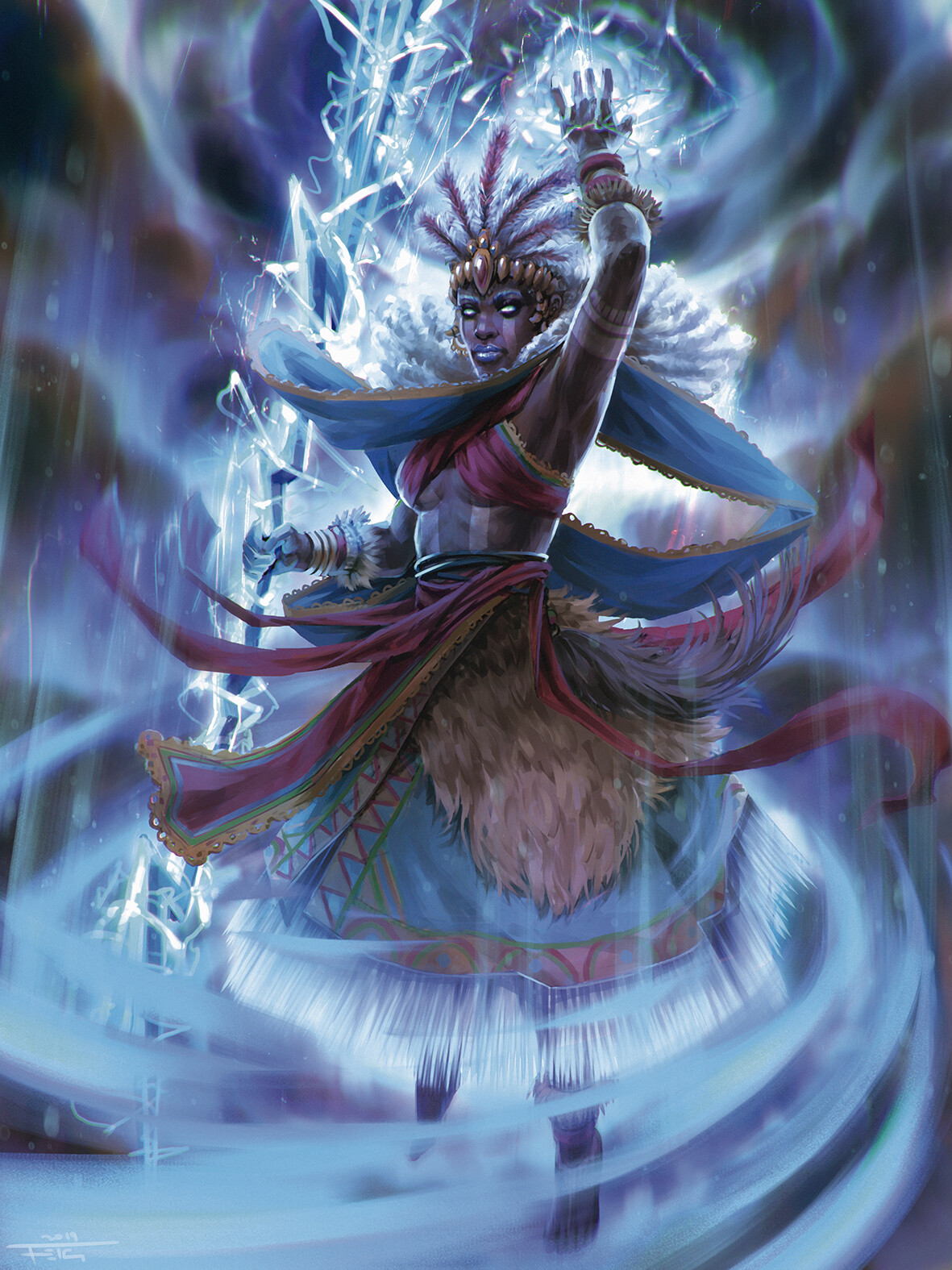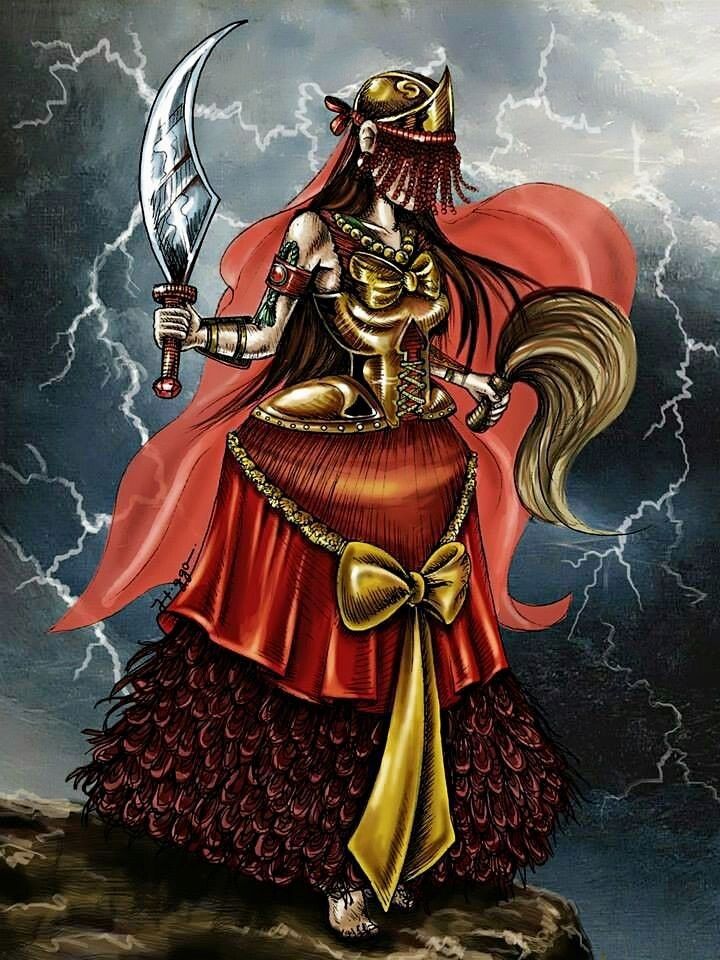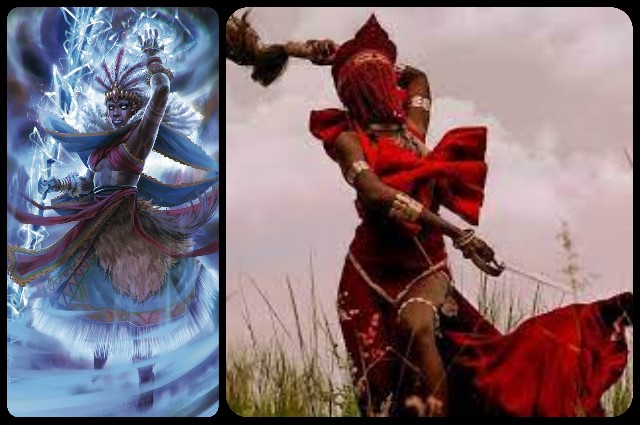Oya, also referred to as Oiá, holds a significant place in Yoruba mythology as a revered deity.
Her devotees span across Yoruba territories, particularly in Nigeria, Benin, and Togo. Known as the goddess of the wind, lightning, and storms, Oya is associated with transformation, change, and destruction. Yemaja, the sea goddess, is believed to be Oya’s ancestor.

In accordance with Yoruba mythology, Oya is the daughter of Obatala, the god of creation, and the beloved wife of Sango, the god of thunder and lightning. Together, Oya and Sango make a fiery couple, with her wind igniting his fire. Oya’s reputation as a formidable warrior precedes her, with her courage and bravery in battle being renowned.
In Yoruba culture, Oya is held in high regard as a powerful goddess capable of instigating change and transformation. She is often depicted as a fierce and formidable warrior, holding a sword or machete in one hand and a fan in the other. The power to control the winds and initiate storms is attributed to her fan, while her sword is employed to cut through obstructions and usher in change.

Oya, known as a rain goddess, is believed to possess the power to control rainfall and bring fertility to the earth. She is often invoked during periods of drought or when crops are failing, as she is thought to have the ability to bring about rain and abundance.
Traditionally, she is depicted as a fierce and mighty warrior holding a sword or machete in one hand and a fan in the other. Her fan is believed to have the power to control wind and bring about storms, while her sword is used to cut through obstacles and bring about change.
In contemporary times, Oya remains an essential figure among the Yoruba people, and her popularity has spread to other parts of the world. She is celebrated in various African diaspora traditions, including Santeria, Candomble, and Vodou, where she is often associated with the spirit of the storm and the power of transformation. In Candomblé, she is known as Oiá, lyá Mésàn.

Oya, the rain goddess, has been depicted in numerous films and literary works in popular culture. In some instances, she is portrayed as a powerful and independent woman, while in others, she is shown as a seductress or a trickster. For example, in the film “Daughters of the Dust” (1991) directed by Julie Dash, Oya’s character is embodied through Yellow Mary, a strong and independent woman who challenges patriarchal traditions and beliefs.
Oya’s presence and attributes are not limited to Yoruba mythology but have also inspired depictions in various literary works and other cultures. In Starhawk’s “The Fifth Sacred Thing,” Oya is one of the elemental forces that represent earth, air, fire, water, and spirit, portrayed as a powerful force of change and transformation.
In the Marvel Comics universe, the character Storm shares similarities with Oya. Storm, also known as Ororo Munroe, has the ability to control the weather and is often depicted as a powerful and independent woman with the power to bring about storms and control winds. The Celtic equivalent of Oya is Brigitte, also known as St. Brigid.

Kali, a goddess in Hindu mythology, shares many attributes with Oya, such as transformation and destruction, and is depicted as a fierce and powerful warrior. Kali is also called upon for protection and guidance and is believed to have the power to bring about change and transformation, similar to Oya.
Oya is known in Yoruba mythology as a goddess of fertility, death, and rebirth, who is believed to have the power to control rain and bring fertility to the earth. She is also known to guide the souls of the dead to the afterlife and protect crops. As a warrior queen, she is associated with strength, leadership, and courage, and is called upon for protection during times of strife and transition. Oya’s ability to initiate change and transformation is a significant aspect of her power and authority. While she can be both sweet and sour, like many other gods, she is revered and celebrated for her diverse attributes and abilities.
